- Home
- Joanne Harris
Five Quarters of the Orange Page 2
Five Quarters of the Orange Read online
Page 2
She is an evil legend here. There was even a book once. Not more than a pamphlet really. Fifty pages, a few photographs. One of the memorial, one of Saint-Benedict’s, a close-up of the fateful west wall. Only a passing reference to the three of us, not even our names. I was grateful for that. A blurry blown-up photograph of my mother, hair scraped back so fiercely from her face that her eyes looked chinesed, mouth crimped into a tight little line of disapproval. The official photograph of my father, the one from the album, in uniform, looking absurdly young, rifle slung casually over one arm, grinning. Then, almost at the end of the book, the photograph that made me catch my breath like a fish with a hook in its throat. Four young men in German uniforms, arms linked except for the fourth, standing a little to the side, self-consciously, a saxophone in one hand… The others are also carrying musical instruments-a trumpet, a side drum, a clarinet-and though their names are not given, I know them all. Les Laveuses military ensemble, circa 1942. Far right, Tomas Leibniz.
It took me some time to understand how they could have found out so many details. Where had they discovered the picture of my mother? As far as I knew there were no pictures of her. Even I had only ever seen one, an old wedding photo in the bottom of a bedroom drawer, two people on the steps of Saint-Benedict’s, he wearing a broad-brimmed hat and she loose-haired and with a flower behind one ear… A different woman, then, smiling stiffly, shyly at the camera, the man beside her standing with one arm protectively around her shoulders. I understood that if my mother knew I had seen the photograph she would be angry, and replaced it, trembling a little, troubled almost without knowing the reason why.
The photograph in the book is more like her, more like the woman I thought I knew but never knew at all, hard-faced and eternally on the brink of rage… Then, looking at the author’s picture on the flyleaf of the book, I finally understood from where the information had come. Laure Dessanges, journalist and food writer, short red hair and practiced smile. Yannick’s wife. Cassis’s daughter-in-law. Poor, stupid Cassis. Poor blind Cassis, blinded by his pride in his successful son. Risking our undoing for the sake of…what? Or had he really come to believe his fiction?
3.
You have to understand that for us the Occupation was a very different matter than for those in the towns and the cities. Les Laveuses has barely changed since the war. Look at it now: a handful of streets, some still no more than broad dirt roads, reaching out from a main crossroads. There’s the church at the back, there, the monument in the Place des Martyrs with its bit of garden and the old fountain behind it, then on the Rue Martin et Jean-Marie Dupré, the post office, Petit’s butcher’s, the Café de la Mauvaise Réputation, the bar-tabac with its rack of postcards of the war memorial and old Brassaud sitting in his rocker by the step, the florist-funeral director opposite (food and death, always good trade in Les Laveuses), the general store-still run by the Truriand family, though fortunately a young grandson who only moved back recently-the old yellow-painted postbox.
Beyond the main street runs the Loire, smooth and brown as a sunning snake and broad as a wheat field, its surface broken in irregular patches by islands and sandbanks, which to the tourists driving by on the way to Angers might look as solid as the road beneath them. Of course, we know otherwise. The islands are moving all the time, rootless. Insidiously propelled by the movements of the brown water beneath, they sink and surface like slow yellow whales, leaving small eddies in their wake, harmless enough when seen from a boat, but deadly for a swimmer, the undertow pulling mercilessly beneath the smooth surface, dragging the unwary down to choke undramatically, invisibly… There are still fish in the old Loire, tench and pike and eels grown to monstrous proportions on sewage and the rotting stuff of upriver. Most days you’ll see boats out there, though half the time the fishermen throw back what they catch.
By the old jetty, Paul Hourias has a shack from which he sells bait and fishing tackle, not spitting distance away from where we used to fish, he and Cassis and I, and where Jeannette Gaudin was bitten by the water snake. Paul’s old dog lies at his feet, eerily like the brown mongrel that was his constant companion in the old days, and he watches the river, dangling a piece of string into the water as if he hopes to catch something.
I wonder if he remembers. Sometimes I see him looking at me-he’s one of my regulars-and I could almost think that he does. He’s aged, of course-so have we all. His moony, round face has darkened, grown pouchy and mournful. A limp mustache the color of chewed tobacco. A cigarette end between his teeth. He seldom speaks-he never was talkative-but he watches with that sad-dog expression, a navy beret crammed over his skull. He likes my pancakes, my cider. Perhaps that’s why he never said anything. He was never one to cause a scene.
4.
I had been back for almost six years when I opened the crêperie. By then I had money set aside, custom, acceptance. I had a boy working for me on the farm-a boy from Courlé, not from one of the Families-and I took on a girl to help with the service. I started with only five tables-the trick has always been to think small at first, to avoid alarming people-but eventually I had double that, plus what I could fit on the terrasse in front on fine days. I kept it simple. My menu was limited to buckwheat pancakes with a choice of fillings, plus one main dish every day and a selection of desserts. That way I could handle the cooking myself, leaving Lise to take the orders. I called the place Crêpe Framboise after the house specialty, a sweet pancake with raspberry coulis and my homemade liqueur, and I smiled a little to myself, thinking of their reaction if they could have known… Several of my regulars even came to calling the place Chez Framboise, which made me smile all the more.
It was at this point that men began to pay attention to me again. You understand, I had become quite a wealthy woman by Les Laveuses standards. I was barely fifty, after all. Plus I could cook and keep house… A number of men paid a kind of court to me, honest, good men like Gilbert Dupré and Jean-Louis Lelassiant, lazy men like Rambert Lecoz, who wanted a lifetime meal ticket. Even Paul, sweet Paul Hourias with his drooping nicotine-streaked mustache and his silences. Of course anything like that was out of the question. This was one foolishness I could never succumb to. Not that it caused me more than the occasional pang of regret; no. I had the business. I had my mother’s farm, my memories. A husband would lose me all that. There would be no way I could conceal forever my assumed identity, and though the villagers might have forgiven me my origins at first, they could not forget six years of deceit. So I refused every offer, the tentative and the bold, until I was generally held to be first inconsolable, then impregnable and then, finally, years later, too old.
I had been in Les Laveuses for almost ten years. For the last five I had invited Pistache and her family to stay during the summer holidays. I watched the children grow from curious big-eyed bundles to small brightly colored birds flying over my meadow and through my orchard on invisible wings. I have a good daughter in Pistache. Noisette (my secret favorite) is more like me; sly and rebellious, black eyes like mine and a heart full of wildness and resentment. I could have stopped her leaving-a word, a smile might have done it-but I did not; fearing, perhaps, that she would turn me into my mother. Her letters are flat and dutiful. Her marriage has ended badly. She works as a waitress in an all-night café in Montreal. She refuses my offers of money. Pistache is the woman Reinette might have been, plump and trusting, gentle with her children and fierce in their defense, soft brown hair and eyes as green as the nut from which she takes her name. Through her, through her children I have learned to relive the good parts of my childhood.
For them I learned to be a mother again, cooking pancakes and thick herb-and-apple sausages. I made jam for them from figs and green tomatoes and sour cherries and quinces. I let them play with the little brown mischievous goats and feed them crusts and pieces of carrot. We fed the hens, stroked the soft noses of the ponies, collected sorrel for the rabbits. I showed them the river and how to reach the sunny sandbanks. I warned them-
with such a catch in my heart-of the dangers, the snakes, roots, eddies, quicksand, made them promise never, never to swim there. I showed them the woods beyond, the best places to find mushrooms, the ways of telling the fake chanterelle from the true, the sour bilberries growing wild under the thicket. This was the childhood my daughters should have had. Instead there was the wild coast of Côte d’Armor, where Hervé and I lived for a time, the windy beaches, pine forests, slate-roofed stone houses. I tried to be a good mother to them, really I did, but I felt there was always something missing. I realize now it was this house, this farm, these fields, the sleepy, reeking Loire of Les Laveuses. This is what I wanted for them, and I began again with my grandchildren. Indulging them, I indulged myself.
I like to think my mother might have done the same, given the chance. I imagine her as a placid grandmother, accepting my rebukes-Really, Mother, you’re going to spoil those children rotten-with an impenitent twinkle, and it does not seem as impossible as once it did. Or maybe I’m reinventing her. Maybe she really was as I remember her-a stony woman who never smiled, who watched me with that look of flat, incomprehensible hunger.
She never saw her granddaughters, never even knew they existed. I told Hervé my parents were dead, and he never questioned the lie. His father was a fisherman, his mother a little round partridge of a woman who sold the fish on the markets. I pulled them around me like a borrowed blanket, knowing that one day I would have to go back into the cold without them. A good man, Hervé, a calm man with no sharp edges in him upon which I could be cut. I loved him-not in the searing, desperate way I loved Tomas; but enough.
When he died in 1976-struck by lightning on an eel-fishing trip with his father-my grief was tinged with a feeling of inevitability, almost of relief. It had been good for a time, yes. But business-life-has to move on. I went back to Les Laveuses eighteen months later with the feeling of waking up after a long, dark sleep.
It may seem strange to you that I waited for so long before reading my mother’s album. It was my only legacy-except for the Périgord truffle-and in five years I had barely glanced at it. Of course, I knew so many of the recipes by heart that I hardly needed to read them, but even so…I had not even been present for the reading of the will. I can’t tell you on what day she died, though I can tell you where; in an old folks’ home in Vitré called La Gautraye, of stomach cancer. She’s buried there too, in the local cemetery, though I only went there once. Her grave is close to the far wall, by the refuse bins. Mirabelle DARTIGEN, it says, then some dates. I notice with little surprise that my mother lied to us about her age.
I don’t really know what prompted my first studies of her album. It was my first summer in Les Laveuses. There had been a drought, and the Loire was maybe a couple of meters lower than usual, showing ugly shrunken verges like the stump of a sick tooth. Roots straggled down into the water, bleached yellow-white by the sun, and children played among the roots on the sandbanks, paddling barefoot in the filthy brown puddles, poking with sticks at the rubbish floating from upstream. Until then I had avoided looking at the album, feeling absurdly at fault, a voyeuse, as if my mother might come in at any time and see me reading her strange secrets… Truth is, I didn’t want to know her secrets. Like walking into a room at night and hearing your parents making love: an inner voice told me it was wrong, and it took more than ten years for me to understand that the voice I heard was not my mother’s, but my own.
As I said, much of what she wrote was incomprehensible. The language-Italian-sounding, unpronounceable-in which much of the album was written was alien to me, and after a few abortive attempts to decipher it, I abandoned the attempt. The recipes were clear enough, printed in blue or violet ink, the mad scrawlings, poems, drawings, accounts between them written with no apparent logic, no order that I could discover.
Saw Guilherm Ramondin today. With his new wooden leg. He laughed at R-C staring. When she asked; didn’t it hurt? he said he was lucky. His father makes clogs. Half the work of a pair, ha ha, & half the chance of standing on your toes during the waltz, my pretty. I keep thinking about what it looks like inside the pinned-up trouser leg. Like an uncooked white pudding, tied up with a piece of string. Had to bite my mouth to stop myself from laughing.
The words are written, very small, above a recipe for white puddings. I found these short anecdotes disturbing, with their joyless humor.
In other places my mother speaks of her trees as if they are living people-Stayed up all night with Belle Yvonne, she was so sick with cold. And though she only ever seems to refer to her children by abbreviation-R-C, Cass and Fra-my father is never mentioned. Never. For many years I wondered why. Of course, I had no way of knowing what was written in the other sections, the secret sections. My father-what little I knew of him-might never have existed.
5.
Then came the business with the article. I didn’t read it myself, you understand; it came in the kind of magazine that seems to view food simply as a style accessory-This year we’re all eating couscous, darling, it’s absolutely de rigueur-while for me food is simply food, a pleasure for the senses, a carefully constructed piece of ephemera, like fireworks, hard work sometimes, but not to be taken seriously, not art, for heaven’s sake, in one end and out the other. Anyway, there it was one day, in one of these fashion magazines. “Travels down the Loire,” or some such thing, a famous chef sampling restaurants on his way to the coast. I remember him too: a thin little man with his own salt and pepper pots wrapped in a napkin, and a notebook on his lap. He had my paëlla antillaise and the warm artichoke salad, then a piece of my mother’s kouign amann, with my own cidre bouché and a glass of liqueur framboise to finish. He asked me a lot of questions about my recipes, wanted to see my kitchen, my garden, was amazed when I showed him my cellar with its shelves of terrines and preserves and aromatic oils (walnut, rosemary, truffle) and vinegars (raspberry, lavender, sour apple), asked where I trained and seemed almost upset when the question made me laugh.
Perhaps I said too much. I was flattered, you see. Invited him to taste this and that. A slice of rillettes, another of my saucisson sec. A sip of my pear liqueur, the poiré my mother used to make in October with the windfall pears, fermenting already as they lay on the hot ground, gloved with brown wasps so that we had to use wooden tongs to pick them up… I showed him the truffle my mother had left me, carefully preserved in the oil like a fly in amber, and smiled as his eyes widened in amazement.
Have you any idea what a thing like that is worth?
Yes, I was flattered in my vanity. A little lonely too, perhaps; glad to talk to this man who knew my language, who could name the herbs in a terrine as he tasted it and who told me I was too good for this place, that it was a crime… Perhaps I dreamed a little. I should have known better.
The article came a few months later. Someone brought it to me, torn out of the magazine. A photograph of the crêperie, a couple of paragraphs.
“Visitors to Angers in search of authentic gourmet cuisine may head for the prestigious Aux Délices Dessanges. In so doing they would certainly miss one of the most exciting discoveries of my travels down the Loire…” Frantically I tried to remember whether I had told him about Yannick. “Behind the unpretentious façade of a country farmhouse a culinary miracle is at work.” A great deal of nonsense followed about “country traditions given a new lease of life by this lady’s creative genius”-impatiently, with a rising sense of panic I scanned the page for signs of the inevitable. A single mention of the name Dartigen and all my careful building work might begin to crumble…
It may seem I’m exaggerating. I’m not. The war is vividly remembered in Les Laveuses. There are people here who still don’t speak to each other. Denise Mouriac and Lucile Dupré, Jean-Marie Bonet and Colin Brassaud. Wasn’t there that business in Angers a few years ago, when an old woman was found locked in a room above a top-floor flat? Her parents had shut her there in 1945, when they found out she’d collaborated with the Germans. She was sixteen. F
ifty years later they brought her out, old and mad, when her father finally died.
And what about those old men-eighty, ninety, some of them-locked away for war crimes? Blind old men, sick old men sweetened by dementia, their faces slack and uncomprehending. Impossible to believe that they might once have been young. Impossible to imagine bloody dreams inside those fragile, forgetful skulls. Smash the vessel, the essence evades you. The crime takes on a life-a justification-of its own.
“By a strange coincidence, the owner of Crêpe Framboise, Mme. Françoise Simon, just happens to be related to the owner of Aux Délices Dessanges…”
My breath stopped. I felt as if a flake of fire had blocked my windpipe and suddenly I was underwater, brown river clutching me under, fingers of flame reaching into my throat, my lungs…
“…our very own Laure Dessanges! Strange to say that she hasn’t managed to find out many of her aunt’s secrets. I for one much preferred the unpretentious charm of Crêpe Framboise to any of Laure’s elegant (but all too meager!) offerings.”
I breathed again. Not the nephew, but the niece. I had escaped discovery.
I promised myself then that there would be no more foolishness. No more talking to kind food writers. A photographer from another Paris magazine came to interview me a week later, but I refused to see him. Requests for interviews came by the post, but I left them unanswered. A publisher wrote to me with an offer to write a book of recipes. For the first time Crêpe Framboise was deluged by people from Angers, by tourists, by elegant people with flashy new cars. I turned them away by the dozen. I had my regulars, my ten to fifteen tables. I could not accommodate so many people.

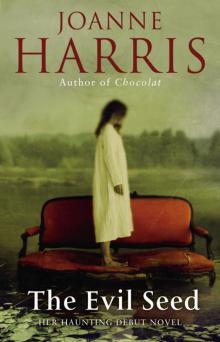 The Evil Seed
The Evil Seed Gentlemen and Players
Gentlemen and Players A Cat, a Hat, and a Piece of String
A Cat, a Hat, and a Piece of String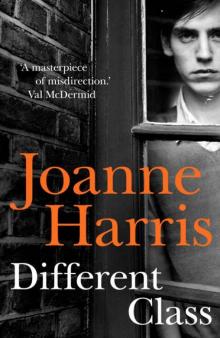 Different Class
Different Class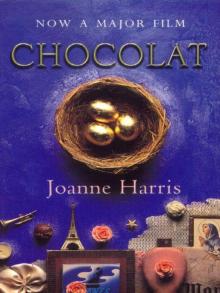 Chocolat
Chocolat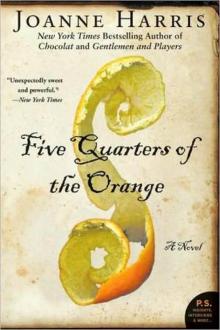 Five Quarters of the Orange: A Novel
Five Quarters of the Orange: A Novel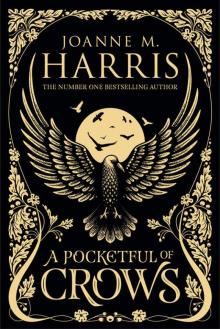 A Pocketful of Crows
A Pocketful of Crows Runelight
Runelight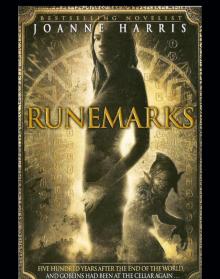 Runemarks
Runemarks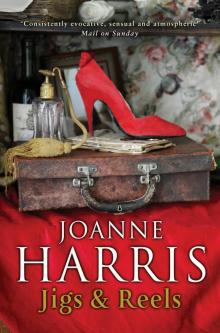 Jigs & Reels: Stories
Jigs & Reels: Stories Sleep, Pale Sister
Sleep, Pale Sister Holy Fools
Holy Fools The Testament of Loki
The Testament of Loki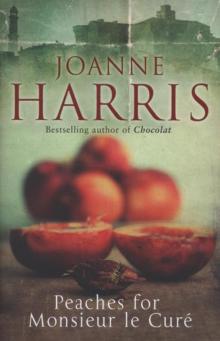 Peaches for Monsieur Le Curé
Peaches for Monsieur Le Curé Blueeyedboy
Blueeyedboy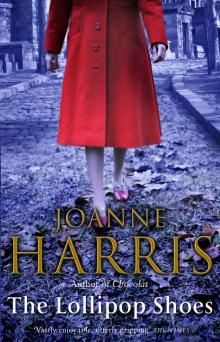 The Lollipop Shoes
The Lollipop Shoes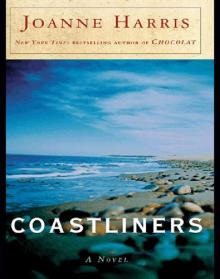 Coastliners
Coastliners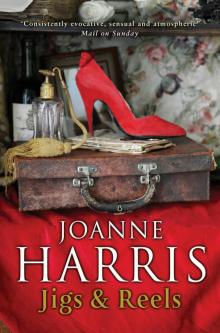 Jigs & Reels
Jigs & Reels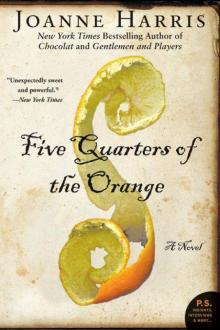 Five Quarters of the Orange
Five Quarters of the Orange